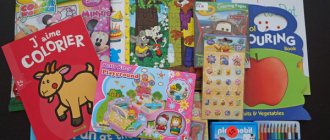How to get along with someone else's child
In Russia, the number of divorces for more than 10 years has remained at the level of 50% of the number of weddings per year. These statistics present new couples with the difficult task of dealing with children from previous relationships, which requires sincerity and patience from both partners.
Secrets of communication
There are no universal recipes for how to get along with someone else’s child, be it the children of your wife or husband from your first marriage, but there are general simple recommendations. Firstly, you should communicate with a child - especially a teenager - as with an adult. Ask what he likes to eat, watch, listen to, but don’t impose.
Secondly, give a man freedom to communicate with his son or daughter; sometimes they need time to be alone - this is an important element of upbringing, their healthy relationship and, as a result, yours. It is important to respect the child's rights to attention and time with his or her parent.
Thirdly, you need to try to make communication with you as comfortable and interesting as possible, take care of leisure time, periodic rest together - this will allow the child to see you as “their person.”
Top 5 mistakes
• Portray a second mother. Your husband’s child from his first marriage constantly compares you with his mother; upbringing should be left to his parents, even if they are divorced. • Be jealous of your man's child. When creating a relationship with someone who already has children, you need to be prepared for the fact that he will always belong to them to some extent. • Create contradictions. If dad said “no,” then he needs to be supported in this. You should not allow a child from your first marriage to do whatever he wants just to make friends with him. • Try to please. Even the smallest ones can sense falsehood. • Limit a man's communication with his child. There are no former children.
Relationships with adult children from first marriage
You should communicate with teenagers and older children as with adults: listen carefully, without distractions, and be sincerely interested in their hobbies. “Dose” your presence, let your son or daughter communicate one-on-one with their father. This will allow your partner to gradually form the right attitude towards you in your child.
In addition, no matter how wonderful a person you are, for your man’s children you are a stranger at first, contact is established slowly and unobtrusively, and trust in you is made up of little things. In a relationship with any person, be it your husband, his children or your child, the most important thing is sincerity and self-confidence.
Share
Tweet
Class
Share
We are in social networks
How to respond to the bad behavior of “strange” children?
Share:
Answer to questions:
Is it appropriate to make comments to other people's children? How not to offend parents (if these are small children of friends, for example)?
Text version of the video:
Good evening, Olga Yurkovskaya is with you, we have the second lesson in the series “Everything you wanted to know about yourself, about life and about people”, this is a lesson with answers to questions. It is advisable to send questions in advance. Post for questions:
https://www.facebook.com/groups/olga.yurkovskaya/permalink/578348458979061/
Question: “I wanted to ask you about your attitude towards strangers (!) children. If the topic of “ours” was discussed in great detail, then your reaction to the “strangers” is interesting. Is it appropriate to make comments so as not to offend parents (if these are small children of friends, for example)? In general, “how to behave with the children of friends.”
Regarding the children of my acquaintances, I am in favor of treating them in approximately the same way as I would treat adults. That is, I have no right to teach, no right to make comments from the position of the mother of these children. But I have the right, even if I see an adult who bothers me, behaves inappropriately, is noisy, etc., I have the right to express how inconvenient it is for me, how much his behavior violates the norms of decency, etc.
In principle, if this behavior is within the framework of social norms, you just don’t like it - for example, children on the playground are running around and making loud noise - this is within the framework of social norms. This means that a nanny will go to the playground and the noise won’t bother her, but I won’t go there. It is clear that I will not say anything to the parents and these children.
It’s another matter if the child is aggressive - then I have to tell the parents that their child is aggressively attacking mine, just not in the format of an accusation, but in the format of “I’m worried, I’m worried, I’m upset” (remember Gippenreiter and “I-messages”) . And only if that parent is unable to influence the child, you can and have the right to protect your child.
Here, of course, someone will judge me, but in a situation when my child was bitten by another child in the kindergarten until he had a bruise - to the point of teeth marks, and those parents and the teacher could not influence it, then I squatted down and looked honestly in the eyes of this little guy and said: “If you touch my son again, I will take these pliers and pull out all your teeth so that you have nothing with which to bite.” He still bit other children after that, but not mine. “Got it” the first time.
And in this situation, I don’t care about the hallucinations that I could somehow injure him or something else. No, I protected my son, I set a clear and understandable boundary for a small child, that my child cannot be bitten - I will not allow him to be offended. And I don't think it was meant to be traumatic or anything like that. - this is a normal warning about the consequences.
If the children are within the limits of social interaction, then I will not make comments or ask somehow through the parents, very carefully - with “I-messages”. If they violate social norms and rules, then I will talk as if I were an adult, as if he were a guy of about 18, for example, or a girl. That is, it will be a respectful, clear, but unambiguous message on the topic of what is uncomfortable for me, how uncomfortable I am, why I am uncomfortable - and a reference to social norms and rules.
Of course, this is not about two-year-old children. If we are talking about children who are one or two years old, then they are still inadequate, so to speak. Tell them, don’t tell them, but there’s no point—it won’t affect their behavior in any way. In this sense, do not go to those “guests” where the children behave absolutely terribly.
Chat: “And how did that boy’s parents react?”
I think it’s unlikely that he told them this, so they didn’t react at all. But before that, the teachers tried to explain to him that biting was forbidden, and they asked his parents, etc. But there the parents had a conflict with each other, almost a divorce, and therefore the child behaved very, very aggressively with other children - because of problems in the family.
But to me my children are more important than other people's. Like a normal female, I will first of all protect my cubs. And therefore, the fact that his parents in the family are divorcing is not interesting to me. I am interested in my child returning from kindergarten not bitten, not with huge bruises with teeth marks on the edges, but healthy and whole. Therefore, in this situation, I believe that if educators are not able to protect my child, and those parents are not able to influence theirs, then it’s time for me to intervene.
Here I would share the immediate danger, for example, to health, and would intervene quite harshly, and just some personal characteristics, like my intolerance to children's noise. So I didn’t go to the playgrounds - I sent the children with a nanny. My children go and go to entertainment centers with someone else. I can buy tickets, but I'm sending another adult. Because being in such noise makes me uncomfortable. So you just need to differentiate how calmly you can relate to children’s behavior and children’s manifestations.
That is, if it is a threat to health or a threat to property, you have the right to stop - but with the same respect as if we were talking about mature adults. The fact that this is a child does not mean that he should be treated rudely, humiliated, insulted, etc. In this situation, I can say “you” and use such cultured words that the smaller ones immediately react - they listened and “lined up.”
But when it comes to protecting my child, I can easily scare someone else’s child if his parent can’t handle it himself or doesn’t want to interfere. In this situation, I will protect my child by any means available to me. I have a purely maternal approach. Yes, yes, Evgenia, respectful attack. The main thing is that it does not come with insults, not through humiliation, but as an equal, then the children react much better - at least they hear.
Source
Why do you think some children grow up to be leaders and others do not?
Find out what is stopping your child from becoming a leader!
Follow the link to take the test for free: https://yurkovskaya.com/deti/
Take a 5-minute test for free and find out what prevents your child from becoming a leader: https://yurkovskaya.com/deti/









